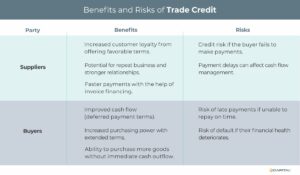
Maximising the Benefits of Trade Credit with Accounts Receivable Financing
Content
Trade credit is a widely used financing arrangement in business-to-business (B2B) transactions, allowing buyers to purchase goods or services on credit with payment deferred to a later date. Suppliers typically offer credit terms of 30, 60, or 90 days, often with an interest-free period, enabling buyers to settle invoices within the agreed timeframe without incurring additional charges. This arrangement helps businesses manage cash flow, allowing them to sell goods or services before making payment.
However, trade credit carries risks for suppliers, as buyers may delay or default on payments. To mitigate these risks and ensure a reliable cash flow, suppliers often assess buyers’ creditworthiness and implement financial solutions that provide immediate liquidity.
Accounts receivable (AR) financing offers a flexible way to unlock cash tied up in unpaid invoices. This financing solution helps businesses optimise liquidity, manage financial risks, and sustain operations while waiting for customers to settle invoices.
This article explores the role of AR financing, how it works, and how businesses can use it to maximise the benefits of trade credit.
Is Trade Credit Worth the Risk?
While trade credit is a valuable tool for attracting customers and driving sales, it also introduces financial risk. Suppliers rely on timely payments to cover operational costs, and late payments or defaults can create serious cash flow challenges.
Despite these risks, trade credit remains a key strategy for many businesses looking to strengthen customer relationships and gain a competitive edge. Offering flexible payment terms can help businesses win new contracts and encourage repeat business. However, to protect financial stability, it is essential to balance risk and cash flow management.
Managing Risk and Optimising Cash Flow with AR Financing
Businesses can use AR financing to reduce the risks associated with trade credit and improve cash flow efficiency. This financing solution allows suppliers to convert outstanding invoices into immediate cash, helping to bridge financial gaps caused by long payment cycles or unpredictable cash flows.
There are three main types of AR financing:
Each option works differently in terms of ownership, risk, and customer interaction but ultimately provides businesses with immediate access to cash.
How AR Financing Works
AR financing provides businesses with quick access to funds without waiting for buyers to pay their invoices. Each form of financing operates slightly differently:
Invoice Financing
- Businesses borrow money against outstanding invoices, using them as collateral.
- Helps improve cash flow while waiting for customers to make payments.
Invoice Factoring
- Businesses sell their outstanding invoices to a factoring company at a discount.
- The factor assumes responsibility for collecting payments from customers.
- Factoring can be structured as recourse (where the supplier remains responsible for unpaid invoices) or non-recourse (where the factor assumes the risk of non-payment).
Invoice Discounting
- Similar to invoice financing but allows businesses to retain control over customer payments.
- Businesses receive a cash advance based on unpaid invoices while continuing to manage their credit control and collections.
Using AR financing, suppliers can mitigate the risks of delayed payments, ensuring consistent cash flow and financial stability. These solutions are particularly useful for businesses that operate with long payment terms or experience seasonal fluctuations.
The Benefits of AR Financing for Suppliers
- Immediate Cash Flow
- Provides fast access to working capital, allowing businesses to cover operating costs and invest in growth.
- Improved Liquidity
- Helps businesses maintain a stable financial position by converting receivables into cash.
- Flexible Funding
- These financing options are covenant-light allowing borrowers to manage funds with minimal lender oversight or reporting.
- Scalability
- As a business grows and generates more invoices, credit limits can increase to accommodate expansion.
Why AR Financing is a Smart Solution for Managing Trade Credit
Trade credit is an essential part of B2B transactions, enabling buyers to defer payments while helping suppliers secure sales. However, it also increases financial risk, particularly for businesses operating in competitive markets or dealing with clients that require extended payment terms.
AR financing helps businesses reduce this risk by ensuring they have access to cash when needed. By leveraging the value of receivables, businesses can stabilise cash flow, maintain liquidity, and continue operations without being impacted by delayed payments.
Conclusion
Trade credit is a valuable tool for businesses looking to attract customers and drive sales, but it can also create cash flow challenges. AR financing provides an effective way to mitigate these risks, ensuring businesses have reliable access to working capital while waiting for invoice payments.
For businesses operating in industries with long payment cycles—such as retail, manufacturing, or wholesale—AR financing can be a vital financial strategy. By improving cash flow and reducing reliance on slow-paying customers, businesses can focus on growth and expansion rather than worrying about liquidity.
Contact us to learn more about effective cash flow solutions to effectively manage the liquidity challenges associated with trade credit.
Key Takeaways
- Trade credit is widely used in B2B transactions but can pose cash flow risks for suppliers.
- AR financing provides businesses with immediate access to cash by leveraging outstanding invoices.
- This financing solution ensures steady liquidity, helping businesses manage trade credit risks effectively.



